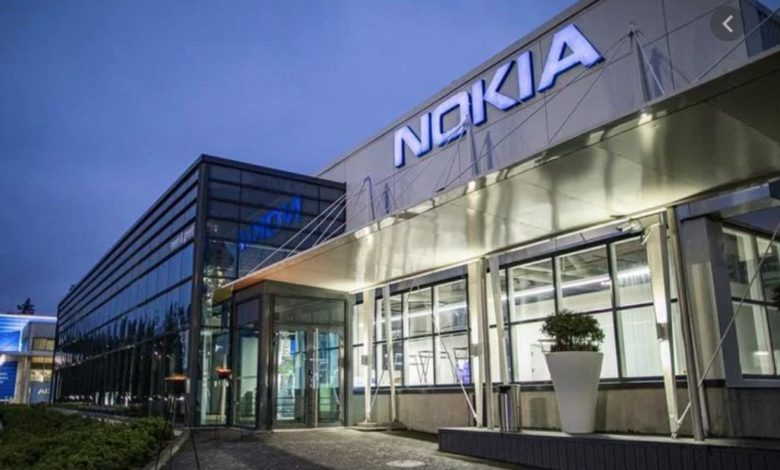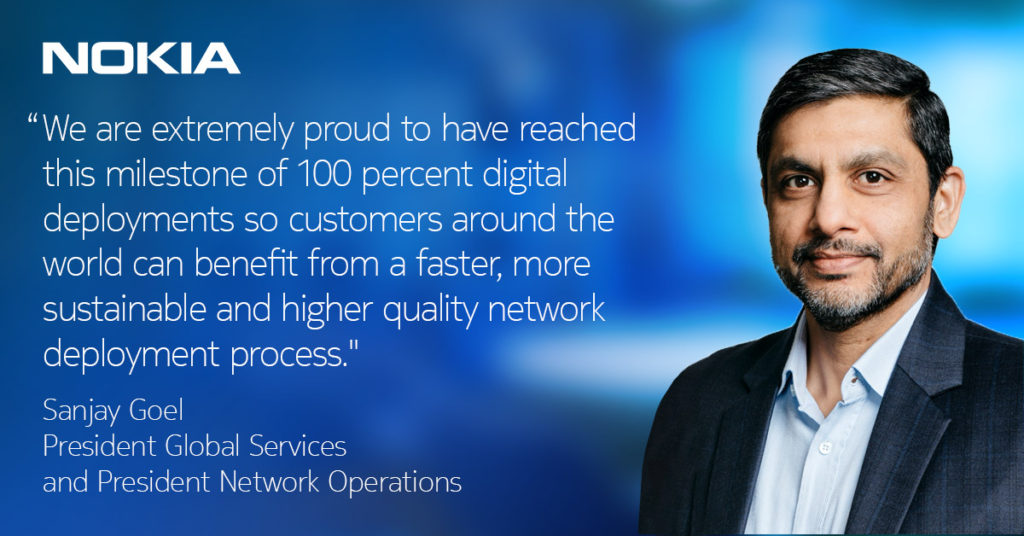
Telecommunications and information technology provider Nokia has announced in a company press release that it has digitalised 100% of its 5G network deployments around the world, bringing high-quality, agility, and transparency to customers globally.
Through the use of digitalisation, machine learning, and automation, Nokia is aiming to simplify the deployment of the network infrastructure, accelerating both time-to-market and return on the 5G investment (ROI) for operators.
Sanjay Goel, President of Global Services, Nokia, stated, “Today, many operators suffer from a fragmented way in how their next-gen 5G networks are designed, built and managed. The adoption of automation, AI, and the digitalization of assets are vital steps in a CSP’s digital transformation journey to capture the full potential of 5G. We are extremely proud to be the first to have reached this milestone of 100 percent digital deployments so customers around the world can benefit from a faster, more sustainable, and higher quality network deployment process.”

5G is becoming increasingly implemented around the world with industries looking to use the technology to increase speed to market, power the cloud software the company uses, and relay important decision data to autonomous vehicles as a few examples.
The telecommunications and information technology provider is not the only business making advancements with 5G technology. HPE unveiled its 5G Lab in July 2020 which aims to accelerate the adoption of open multivendor 5G solutions.
By digitising 100% of its 5G network deployments, the telecommunications and information technology provider aims to enable a simpler, faster, more efficient, and higher-quality delivery of services to its customers. In the past, network deployments have relied upon a combination of both paper-based and digital documentation which can often lead to errors and inefficiencies.
With digital project orchestration and data inventories, Nokia is claiming to be able to enable network rollouts to be carried out swiftly and cost-effectively, matching the agility demands from customers and helping them to bring new services to market faster. In addition, it will aim to help CSPs dramatically reduce time to market and generate increased revenue
By the telecommunications and information technology provider completely digitalising its 5G network deployments, the company is aiming to enable a simpler, faster, more efficient, and higher-quality delivery of services.
Nokia claims that digital and automated network innovations can accelerate 5G deployments by up to 30% and help minimise errors. Additionally, it can make deployments more sustainable as it minimises the CO2 footprint by reducing paper usage. It is estimated around 1,500 trees will be saved each year by the rollout of this new initiative.
The telecommunications and information technology provider explained in the press release how digital deployment enables communication service providers (CSPs) to easily manage their assets by providing a digital database of network assets that can be used remotely (site visits have reduced by 30%). This can make it much easier to upgrade and expand a CSPs estate. In regard to maintaining service operations installation quality and cycle times, these have apparently decreased by 30% and 25% respectively.
Chris Antlitz, Principal Analyst at TBR explained how the telecommunications and information technology providers customers can expect to benefit from the new rollout by saying: “Nokia’s ability to provide digitalized network deployment services spanning the full workflow of site development exemplifies the company’s commitment to and progress with its digital transformation journey. Nokia’s customers will greatly benefit from these innovations in infrastructure service delivery digitalization as it will help improve quality and speed KPIs and lower TCO pertaining to rolling out 5G networks.”
Key digital deployment services that the telecommunications and information technology provider have claimed to make available include:
- Drone-led site surveys to ensure site builds are completed ‘first time right’ with material inventory down to a one-inch accuracy
- Site digital database for faster technology evolution and upgrades as sites can be accessed remotely and CSPs can get a 360 virtual view
- Workflow orchestration to deploy the right crews, with the right equipment, at the right time and place
- Artificial intelligence and machine learning-powered tools to identify defects in real-time through automated analysis.
- Real-time project dashboards for greater transparency and project management effectiveness
Nokia commented that its digital deployments are continuously evolving to take advantage of the power of AI-based innovations with the aim to further improve efficiencies at scale.
The telecommunications and information technology provider explained that the systems intelligent defect-recognition will use powerful machine learning-based algorithms to identify defects in real-time through automated analyses of pre/post-implementation pictures or video content. Users can also expect the system to intelligently provide feedback on space availability to place specific equipment, without the need for a site visit.



